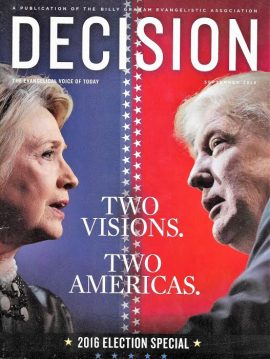By Janine Warrington
Leading up to the primaries in the 2016 presidential election, I was talking to a friend of mine at church. She told me, “I’m going to vote for Trump because he’s going to win anyway,” even though she didn’t think he was the best candidate. We continued to discuss candidates, and when I mentioned Bernie Sanders, she responded by saying, “Oh! I didn’t know he was Republican!” My friend assumed that because our religious affiliations were aligned, our political affiliations would be as well. The idea that I could claim the same God and Gospel as she did but not vote the same way was perplexing to her.
There is a trend of nominal Christianity in America. Many people adopt the label of a Christian and align themselves with others who are vocal about their same label. It’s as if employing the words “Jesus,” “Bible,” or “God bless America,” demonstrates a political candidate’s validity. This claimed identity then acts as a shortcut for voters who don’t want to research a candidate’s values or platforms.
Comedian and South Africa native Trevor Noah in an interview describes the two-party system as “one of the most destructive forces in America right now.”
He illustrates the way that many Americans vote based on party affiliation, even against their own interest. People like my friend from church, if they were to vote based on ideas rather than political party, might vote entirely differently. As Noah says, “Once you remove the blue and the red, you’ll be surprised at who people actually choose. You know, if you go back to the election, that’s what people said. They said, ‘Look, I don’t like Donald, but that’s my only choice. What choice do I have?’”
Arguably, this party loyalty is made stronger when it is informed by nominal religious affiliation. This makes it easier for religious authority figures to persuade their followers to vote in a certain way.
In September 2016, I received a free copy of Decision magazine in the mail, a publication of the Billy Graham Evangelistic Association. The cover article, “Two Visions, Two Americas,” opens up with a call to voters to bring America back to Christian values. Throughout the publication, Franklin Graham and other writers urge Christians to understand the issues and make a biblically informed vote. Unfortunately, too often the idea of a “biblically informed vote” hinges on one or two hot button issues that are portrayed without nuance. For many politically loyal Christians, all they need is Graham’s endorsement of a certain candidate to make their decision.

This is different from casting a vote informed by the values of one’s faith. If a Christian is to take their faith seriously, they ought to research their Scriptures and traditions. They ought to look to Jesus’ teachings and actions to determine what Christian values look like, rather than voting for the person their pastor or a Christian publication endorses.
This is difficult for me. It’s much easier to look for blue or red on a ballot than to open up the Voters’ Guide and thoughtfully and prayerfully consider each candidate. But there is more than one way to be a Christian in America. There is more than one way to understand Scripture. There is more than one way to make a biblically informed vote. So, ultimately, each voter should weigh the ideas and values of individual candidates to make their own informed decision.
If everyone who reads and appreciates FāVS, helps fund it, we can provide more content like this. For as little as $5, you can support FāVS – and it only takes a minute. Thank you.
[give_form id=”53376″ show_title=”true” display_style=”button”]







